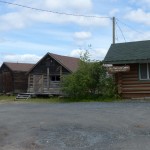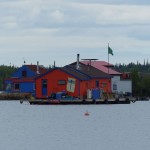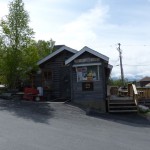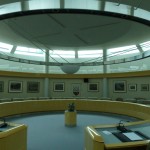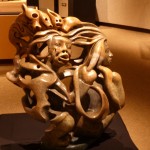6/15 – 6/17 Yellowknife is a relaxed city of about 24,000, which is almost half of the population of the entire NWT. The uptown section contains the usual architecture of any modern city, including skyscrapers, while Old Town consists of original one room log “shacks” sitting side by side with modern houses on irregular lots which gives the area a picturesque character. Out in the bay are houseboats which decidedly live up to their name. First stop was the Yellowknife Visitor Center where James gave us the lowdown on things to do and places to see; he also gave us a parking sticker so we wouldn’t have to feed the meters. Lunch at the Wildcat Café, in Old Town. The Café is one of the oldest buildings in Yellowknife and exudes the history of the area. The food was delectably delicious and up to the standards of any 4 star restaurant.
Next stop was the NWT Legislative Assembly Building. The building is unique, among legislatures we have seen in that it is flooded by natural light giving the rooms a warm, congenial feeling. The government is also unique in that there are no political parties and the 13 representatives govern by consensus which assures that the concerns of each member is given full consideration.
The following day we went to the Prince of Wales Northern Heritage Museum which was incredibly well done. It contained a profusion of information about the NWT, its people, culture and industry. It also housed an exquisite collection of sculptures by Abraham Anghik Ruben a Inuvialuit artist. These works are the finest examples of Inuit sculpture we have seen.
Had dinner at Bullocks Bistro with a very nice couple from Calgary. Bullocks serves fish caught in Great Slave Lake; it’s unfortunate that transportation to and from Yellowknife is so arduous, otherwise the lake could support a reasonable sized fishing industry. As it is, the only market is local so there is no real commercial fishery.
